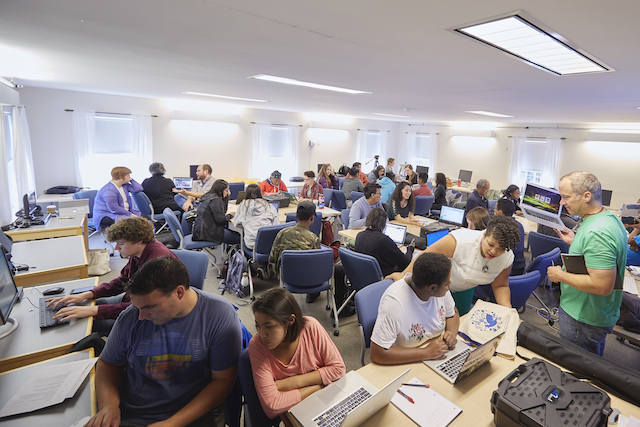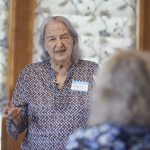Bread Loaf Teacher Network: A Resource for Virtual Teaching and Learning in Time of Pandemic
1May 21, 2020 by Dixie Goswami


-by Dixie Goswami. Dixie, who co-founded the Bread Loaf Teacher Network, is a revered BLSE faculty member. She retired in August after 40 years of work with BLSE and BLTN.
Bread Loaf Teacher Network Next Generation Leadership Network: Coping with the Present, Preparing for the Future
What lessons about BLTN, NextGen, and Bread Loaf public school students are being learned from the pandemic? Lou Bernieri (co-director of Andover Bread Loaf) said it best: “We’ve learned that networking youth isn’t only a powerful educational strategy, but for our most vulnerable, under-resourced youth, it’s critical to their physical, psychological, and spiritual well being. When the pandemic hit our youth we were able immediately to access caring, knowledgeable adults and each other. We see this in NextGen, across the network and locally inABL Lawrence most clearly, committed to serving as a resource locally and to the larger community as we cope with the present and prepare for the future.”
Since its inception in 1984 until the present, as many as a thousand teachers from rural and urban public school settings, most underserved, and thousands of students in their classrooms have been active members of Middlebury BLSE’s Bread Loaf Teacher Network (BLTN). Most participate at a high level of engagement for five years or more. Their experience with year-round remote teaching and learning over the years is well documented in their published narratives and in studies of various aspects of BLTN’s extensive and varied online exchanges and projects.
Teachers write about using digital tools in their classrooms and across the network: they are using social media, apps, blogging, creating digital stories, producing videos, designing web sites, and forming niche communities to conduct inquiries and reach public audiences. Lively, engaging accounts of online classroom communities are not recipes or tool-kits but demonstrations of socially engaged, culturally sustaining, effective teaching, often in communities where access and connectivity are challenges and where their online classes are not the norm.
The sample below of archived publications by and about BLTN remote, networked teaching and learning, are engaging, informative and, in our view, a powerful resource in the time of COVID 19 disruption and most urgently in the planning for the future of public education. One example, Exchanging Lives: Middle School Students Online by Scott Christian with Foreword by Andrea Lunsford. NCTE 1997, describes an online study of The Diary of Anne Frank by students in six networked classrooms and was featured in an earlier issue of this journal. More complete links to BLTN publications can be found here.
Atkins, Janet. “Asking The Hard Questions: Writing About Environmental Risks for Rural Communities.” Writing to Make a Difference: Classroom Projects for Community Change, Teachers College Press, 2001, pp. 141–54.
Benson, Chris, and Scott Christian with Walter Gooch and Dixie Goswami. Writing to Make a Difference: Classroom Projects for Community Change, Teachers College, Columbia University, 2002.
Benson, Chris. “Between Sacred Mountains: An Interview with Rex Lee Jim.” Writing to Make a Difference: Classroom Projects for Community Change, Teachers College Press, 2001, pp. 174–82.
Besser, Erin and Lillian Reeves. “A How-To Guide for Going Online in the Age of COVID-19.” 14. Mar. 2020.
McKenna, Tom. “A License To Think: Writing for Change as Privilege, Obligation, and Professional Journey.” Writing to Make a Difference: Classroom Projects for Community Change, Teachers College Press, 2001, pp. 194–214.
Miera, Susan L. “Beyond E-Mail: Writing and Publishing for the Cybernet Community–A Scenario.” Writing to Make a Difference: Classroom Projects for Community Change, Teachers College Press, 2001, pp. 124–40.
Branscombe, Amanda, et al., editors. Students Teaching, Teachers Learning. Boynton/Cook Publishers, 1992.
Bwire, D. (2016). Meaning Across Difference: Exploring Intercultural Communication Strategies in an Alaska-Kenya Collaboration . (Electronic Thesis or Dissertation). Retrieved from https://etd.ohiolink.edu/
Calkins, Annie, editor. Standard Implications II: Classroom Truths and Consequences. University of Alaska Southeast, 2001.
Calkins, Annie, and Scott Christian, editors. Standard Implications: Alaskans Reflect on a Movement to Change Teaching. University of Alaska Southeast, 2000.
Christian, Scott. Exchanging Lives: Middle School Writers Online. National Council of Teachers of English, 1997.
Elder, John; Bowen, Betsy; Schwartz, Jeffrey; and Goswami, Dixie, “Word Processing in a Community of Writers: An Introduction to Composition” (1989). English Faculty Book Gallery. 18. Web. <https://digitalcommons.fairfield.edu/english-books/18>
Goswami, Dixie and Peter Stillman (eds.). Reclaiming the Classroom: Teacher Research As An Agency For Change, Boynton/Cook Publishers, 1987, pp. i–iii.
Lewis, Ceci. “The Use of Narrative as Teacher Research: Learning About Language and Life Through Personal Stories.” On Teacher Inquiry: Approaches to Language and Literacy Research. Eds. Dixie Goswami, Marty Rutherford, and Diane Waff. Columbia University: Teachers College Press, 2009. 43-68. Print.
Lewis, Ceci, Scott Christian, and Eva Gold. “An Education for What? Reflections of Two High School Seniors on School.” In Our Own Words: Students’ Perspectives on School. Eds. Jeffrey Schultz and Allison Cook-Sather. Lanham: Rowman and Littlefield Publishers, 2001. 93-101. Print.
Gold, Eva, et al. Networking Across Boundaries of Place, Culture and Role: A Report to Bread Loaf Rural Teacher Network. Research for Action, Oct. 1997.
Gorham, Rich. “Peace Literacy in Haiti.” Bread Loaf Teacher Network Journal. 4 (2014). Web. <https://sites.middlebury.edu/bltnmag/2014/12/16/peace-literacy-in-haiti/>.
Goswami, Dixie, Ceci Lewis, Marty Rutherford, and Diane Waff. On Teacher Inquiry: Approaches to Language and Literacy Research. Columbia University: Teachers College Press, 2009. Print.
Howard, Tharon, and Chris Benson, editors. Electronic Networks: Crossing Boundaries/Creating Communities. Boynton/Cook Publishers, 1999.
McKenna, Tom, et al. “Hózhóo’ó Hólne’ Writing Conference Begins Today.” BLTN NextGen Leadership Network, 17 Mar. 2018, http://breadloafnextgen.middcreate.net/navajo-nation/hozho-hane-writing-conference-begins/.
McKenna, Tom with Jennifer Coreas, Amaryllis Lopez, and Rex Lee Jim. “One Word at a Time: Peace Literacy in El Salvador.” Bread Loaf Teacher Network Journal (7) 2018. Web <https://sites.middlebury.edu/bltnmag/2018/01/16/one-word-at-a-time-peace-literacy-in-el-salvador/>
Rucker, Julie Henderson. Effects of Online, Collaborative Discourse on Secondary Student Writing: A Case Study of the History and Ecology of an Electronic Exchange. Georgia Southern University, 26 Aug. 2008, http://www.georgiasouthern.edu/etd/archive/fall2008/julie_h_rucker/rucker_julie_h_200808_edd.pdf.
Rutherford, Marty, and Ceci Lewis. “Resources for Doing Your Own Teacher Research.” On Teacher Inquiry: Approaches to Language and Literacy Research. Eds. Dixie Goswami, Marty Rutherford, and Diane Waff. Columbia University: Teachers College Press, 2009. 90-102. Print.
Rutherford, Marty. “Using Narrative as Teacher Research: Learning about Language and Life through Personal Stories.” On Teacher Inquiry: Approaches to Language and Literacy Research. Eds. Dixie Goswami, Marty Rutherford, and Diane Waff. Columbia University: Teachers College Press, 2009. 43-68. Print.
Reeves, L. (2014). Toward a Theory of Safe Passage: Agentic Practices of Women Writers Who Teach. (Electronic Dissertation). Retrieved from https://scholarcommons.sc.edu/.
Waff, Diane. “An Insider Voice: Leading as a Teacher.” Inquiry as Stance: Practitioner Research in the Next Generation. Eds. Marilyn Cochran-Smith and Susan L. Lytle. New York: Teachers College Press, 2009. 310¬-325. Print.
Wandera, D. (2019). “Resisting Epistemic Blackout: Illustrating Afrocentric Methodology in a Kenyan Classroom.” In Reading Research Quarterly, 0(0), p. 1– 20. Retrieved from https://ila.onlinelibrary.wiley.com/doi/10.1002/rrq.283
Wandera, D. & Farr M. (2018). “Interrupting Cultural Deficiency: Illustrating Curricular Benefits of Plurilingualism in a Kenyan Classroom.” Journal of Language and Literacy Education. https://eric.ed.gov/?id=EJ1175851
Wandera, D. (2016). “Teaching Poetry Through Collaborative Art: An Analysis of Multimodal Ensembles for Transformative Learning.” Submitted to the Journal of Transformative Education,~14,~p. 305 – 326 http://jtd.sagepub.com/content/14/4/305
Wandera, D. (2015). “Mabeshte Revisited. Beyond the Narrative Barrier: Reclaiming Teaching Stories.” In Bread Loaf Teacher Network Journal, 5(1), Retrieved from https://sites.middlebury.edu/bltnmag/2015/10/29/2367/
Wandera, D. (2015). “The Role of Education in a Pluralistic World.” In Journal of Language, Identity and Education, 14(1), 50-53. http://www.tandfonline.com/doi/full/10.1080/15348458.2015.988573#abstract
Wandera, D. (2014). “Navigating the Turbulence of Education Reform through Studio Thinking.” In Journal of Social Sciences Research, 1, 43-45. http://www.iossbr.com/#!journal/c1ri8
Wandera, D. (2014). “The Threat of Obsolescence: Teaching and Learning Responding to Technology.” In Journal of Pedagogy, Technology and Education, 24 (2), p. 279 – 281. http://www.tandfonline.com/doi/abs/10.1080/1475939X.2014.913533#.U9E3ybFY9fx
Wandera, D. (2013). “What to Do When Teens say ‘Amka Ukatike’: An Exploration of Agency in Teen Oral Literacy Performed Through Kenyan Hip Hop”. African Journal of Teacher Education. Vol. 3/1, P. 1 – 14. http://gir.uoguelph.ca/index.php/ajote/article/view/1943
Wood, Douglas E. Teaching as Learning: From Content Knowledge to Pedagogical Practice. Doctoral Dissertation, Harvard University, 2000. Winner of the 2000 Thayer Prize, Harvard University.
Wood, Douglas E. and Kurt Caswell. “Making Connections: The USjApanLink Project” In Christopher Edgar and Susan Nelson Wood (Eds.), The Nearness of You: Students and Teachers Writing Online. (pp. 216-230), New York: Teachers and Writers Collaborative, 1996.
Wood, Douglas E and Kurt Caswell. ” Reflective Voices: Constructing Meaning in the USjApanLink Project” In Tharon Howard and Chris Benson with Rocky Gooch and Dixie Goswami (Eds.), Electronic Networks: Crossing Boundaries/Creating Communities. (pp. 151-159), Portsmouth: Heinemann, Boynton/Cook Publishers, 1999.
Category BLTN and Policy, BLTN NextGen, BLTN Teachers, Featured, Spring 2020 | Tags:
This is an absolutely wonderful resources for teachers and students with internet, but I’m wondering about something more tangential; that key piece: access to internet.
It’s not uncommon that under-resourced students in rural and urban areas don’t have internet in their homes. I know in East Tennessee, where I currently reside, the county below us allows students to park their cars at fast food restaurants just to use their free wifi to do their homework. Now, not sure if you’ve ever tried, but McDonald’s free wifi is not the best, and sitting in your car for hours struggling with a math problem is a nightmare.
While we can provide resources for our educators and school administrators, what this article inspires me to do is urges schools to use this moment as leverage for community internet: push to abandon corporate internet providers who believe it’s not lucrative to install internet service in, say, a rural area, and instead push for free, community internet infrastructure (which is possible and places are doing it!).
In the meantime, I’ll be printing out these articles at the library : )